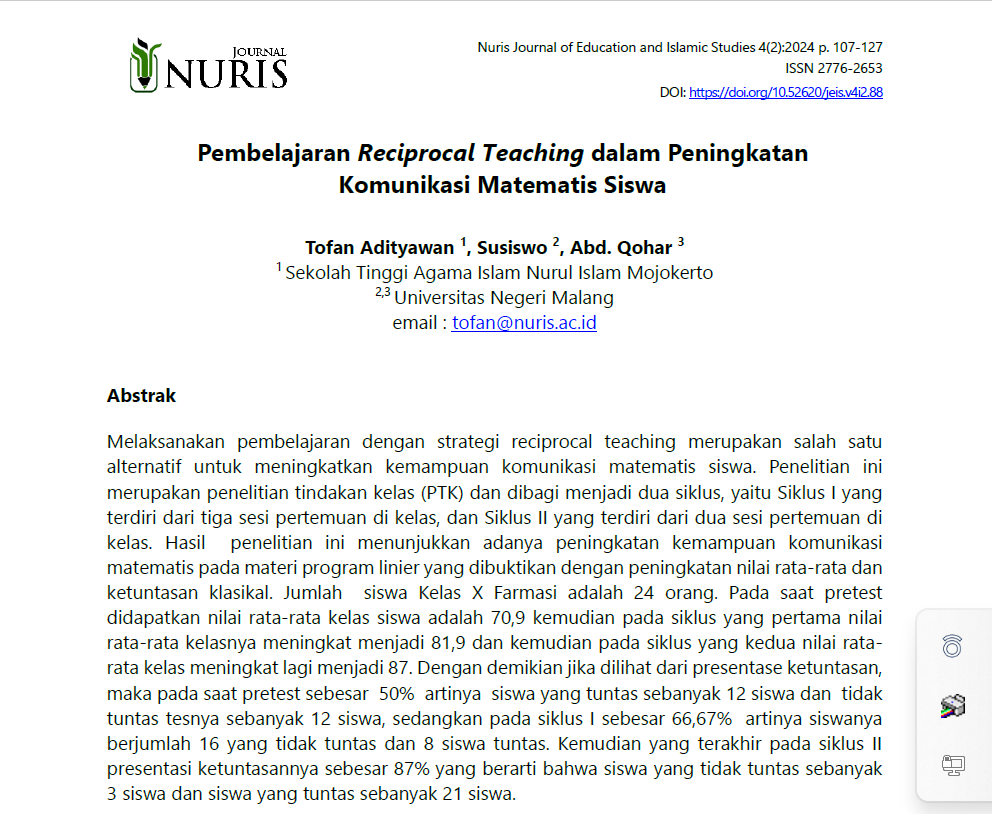Pembelajaran Reciprocal Teaching dalam Peningkatan Komunikasi Matematis Siswa
Main Article Content
Abstract
Melaksanakan pembelajaran dengan strategi reciprocal teaching merupakan salah satu alternatif untuk meningkatkan kemampuan komunikasi matematis siswa. Penelitian ini merupakan penelitian tindakan kelas (PTK) dan dibagi menjadi dua siklus, yaitu Siklus I yang terdiri dari tiga sesi pertemuan di kelas, dan Siklus II yang terdiri dari dua sesi pertemuan di kelas. Hasil penelitian ini menunjukkan adanya peningkatan kemampuan komunikasi matematis pada materi program linier yang dibuktikan dengan peningkatan nilai rata-rata dan ketuntasan klasikal. Jumlah siswa Kelas X Farmasi adalah 24 orang. Pada saat pretest didapatkan nilai rata-rata kelas siswa adalah 70,9 kemudian pada siklus yang pertama nilai rata-rata kelasnya meningkat menjadi 81,9 dan kemudian pada siklus yang kedua nilai rata-rata kelas meningkat lagi menjadi 87. Dengan demikian jika dilihat dari presentase ketuntasan, maka pada saat pretest sebesar 50% artinya siswa yang tuntas sebanyak 12 siswa dan tidak tuntas tesnya sebanyak 12 siswa, sedangkan pada siklus I sebesar 66,67% artinya siswanya berjumlah 16 yang tidak tuntas dan 8 siswa tuntas. Kemudian yang terakhir pada siklus II presentasi ketuntasannya sebesar 87% yang berarti bahwa siswa yang tidak tuntas sebanyak 3 siswa dan siswa yang tuntas sebanyak 21 siswa.
Downloads
Metrics
Article Details

This work is licensed under a Creative Commons Attribution 4.0 International License.
License Terms
In submitting the manuscript to the journal, the authors certify that:
- They are authorized by their co-authors to enter into these arrangements.
- The work described has not been formally published before, except in the form of an abstract or as part of a published lecture, review, thesis, or overlay journal.
- That it is not under consideration for publication elsewhere,
- That its publication has been approved by all the author(s) and by the responsible authorities – tacitly or explicitly – of the institutes where the work has been carried out.
- They secure the right to reproduce any material that has already been published or copyrighted elsewhere.
- They agree to the following license and copyright agreement.
References
Altun, Sertel. 2015. The Effect of Cooperative Learning on Students’ Achievement and Views on the Science and Technology. International Electronical Journal of Elementary Education. Issue 7, Volume 3 ISSN: 1307-9298
Arends, R.I. 2013. Learning to Teaching 9th. Terjemahan Made Frida Yulia. Jakarta: Salemba Humanika
Beecher J.A, Penna J.A. & Bittinger M.L. 2006. Algebra and Trigonometry 3ed. Publishing as Pearson Addison Wesley.
Brenner, M. E.1998. Development of Mathematical Communication in Problem Solving Groups By Language Minority Students. Bilingual Research Journal, 22:2, 3, & 4 Spring, Summer: University of California, Santa Barbara.
Doolittle, P. E., Hicks, D. & Triplett, C. F. 2006. Reciprocal Teaching for Reading Comprehension in Higher Education: A Strategy for Fostering the Deeper Understanding of Texts. International Journal of Teaching and Learning in Higher Education, Volume 17, Nomor 2, Page 106-118.
Efendi, N. 2013. Pendekatan Pengajaran Reciprocal Teaching Berpotensi Meningkatkan Ketuntasan Hasil Belajar Biologi Siswa SMA. Sidoarjo. Pedagogia Volume 2, Nomor 1, Universitas Muhammadiyah Sidoarjo.
Freihat, S. & Al-Makhzoomi, K. 2012. The Effect of the Reciprocal Teaching Procedure (RTP) on Enhancing EFL Students' Reading Comprehension Behavior in a University Setting. International Journal of Humanities and Social Science Volume 2 Nomor 5.
Ghorbani, M. R., Gangeraj, A.A. & Alavi, S. Z. 2013. Reciprocal Teaching of Comprehension Strategies Improves EFL Learners' Writing Ability. Current Issues in Education Volume 16, Nomor 1, Arizona State University.
Huang, Jingzi & Normandia, Bruce. 2009. Mathematically: A Case Study of a Secondary Mathematics Classroom: Monmouth University, NJ, USA.
Kupezynski, L. 2012. Cooperative Learning in Distance Learning: A Mixed Methods Study. International Journal of Instruction Volume 5 Nomor 2 Page 81-90
Macmath, S.W. J & Chi, X. 2009. Problem-Based Learning in Mathematics (A Tool for Developing Students’ Conceptual Knowledge). A Partership between the Literacy and Numeracy Secretariat and the Ontario Association of Deans of Education. University of Toronto.
NCTM 2000. Principles and Standards for school mathematics. Reston, VA: National Council of Teachers of Mathematics.
Palincsar, A.S. & Brown, A.L. 1984. Reciprocal Teaching of Comprehension Fostering and Comprehension Monitoring Activities. Cognition and Intruction. Lawrence Erlbaum Associates, 177-175.
Polya, G. 1985. How to Solve It:A New Aspect of Mathematical Method. Princeton University Press. Princeton and Oxford. Printed in University of America.
Qohar, Abd. 2009. Penggunaan Reciprocal Teaching untuk Mengembangkan Komunikasi Matematis. Prosiding Seminar Nasional Penelitian, Pendidikan Penerapan MIPA Universitas Negeri Yogyakarta.
Qohar, Abd & Sumarmo, U. 2013. Improving Mathematical Communication Ability and Self Regulation Learning Of Yunior High Students by Using Reciprocal Teaching. IndoMS. J.M.E. Volume 4, Nomor 1.
Rachmayani, Dwi. 2014. Penerapan Pembelajaran Reciprocal Teaching untuk Meningkatkan Kemampuan Komunikasi Matematis dan Kemandirian Belajar Matematika Siswa. FIP Universitas Muhammadiyah Jakarta. Jurnal Pendidikan UNSIKA Volume 2, Nomor 1.
Slavin. 2010. Educational Psychology: A Foundation for Teaching
Tharpe, B.K. 2000. Talk Your Math Off: Communication in the Mathematics Classroom: State University.
Tran, V.D. 2014. The Effects of Cooperative Learning on the Academic Achievement and Knowlwdge Retention. International Journal of Higher Education. Nomor 2, Volume 3
Waege, K. 2010. Motivation for Learning Mathematics In Terms of Needs and Goals. Proceedings of CERME Lyon France
Wichelt, L. 2009. Communication: A Vital Skill of Mathematics. Action Research Project Report. University of Nebraska.

